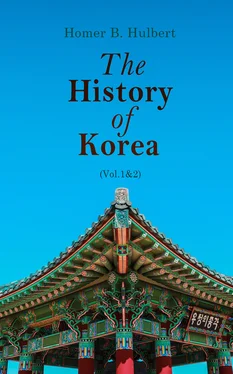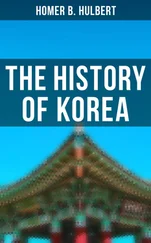As the year 936 opens we see king Wang-gön with his two former rivals, the peaceful one and the warlike one, gathered under his wing, and the only cloud upon his horizon the attitude of Kyŭn-whŭn’s sons in the south. This was soon settled. The king in company with Kyŭn-whŭn, at the head of an army of 87,000 men, marched southward and engaged the pitiable force that was all the malcontents could now muster. When they saw this tremendous army approaching and knew that Kyŭn-whŭn was there in person, surrender was immediate. Wang-gön’s first demand was “where is Sin-geum?” He was told that he was in a fortress in the mountains with a small force and was prepared to fight to a finish. He was there attacked and 3,200 men were taken and 5,700 killed, which shows how desperate the battle was. Sin-geum and his two brothers were captured. The two other sons of Kyŭn-whŭn were executed, because they had driven their father away, but Sin-geum in some way showed that he had not been a principal actor in that disgraceful scene and so escaped what we may well believe was merited punishment. There on the field the old man Kyŭn-whŭn died. It is said that his death was caused by chagrin that Sin-geum was not killed with his brothers.
It was in 938 that Wang-gön went outside the walls of the capital to meet a celebrated monk named Hong-bŭm, who had come originally from Ch’un-ch’uk monastery in the land of Sŭ-yŭk.
All this time interesting reforms were in progress. The names of all the prefectures throughout the country were changed. This has always been customary in Korea with a change of dynasty. The next year, 939, the new king of Koryŭ was formally recognized by the Emperor who sent and invested him with the insignia of royalty. The crown prince of T‘am-na, on Quelpart, came and did obeisance at the court of Koryŭ. A redistribution of the farming lands throughout the country was effected, by which, the records say, the worthy received more while others received less. It would be interesting to know in what way the test of worthiness was applied.
In 942 the Kitan power in the north tried to make friendly advances and sent a present of thirty camels. But Wang-gön remembered the way in which Kitan had feigned friendship for Pal-hă and then treacherously seized her; and for this reason he showed his opinion of Kitan now by banishing the thirty men and tying the thirty camels to Man-bu bridge and starving them to death.
King Wang-gön was now sixty-five years old. His life had been an active one; first as a warrior and then as the administrator of the kingdom which he had founded. Feeling that his end was approaching, he set himself to the task of formulating rules for his successor. As a result he placed in the hands of his son and heir ten rules which read as follows:
(1) Buddhism is the state religion.
(2) Build no more monasteries.
(3) If the first son is bad let the second or some other become king.
(4) Do not make friends with Kitan.
(5) Do honor to P‘yŭng-yang, the ancient capital.
(6) Establish an annual Buddhist festival.
(7) Listen to good men and banish bad ones.
(8) As the south is disaffected towards us do not marry from among the people of that section.
(9) Look after the interests of the army.
(10) Be always ready for emergencies.
After urging his son to lock all these precepts in his heart the aged king turned to the wall and died. These ten laws are typical of the man. They inculcated reverence for the best religion that had come under his notice, but in the same breath forbade the disproportionate growth of priest-craft, for he had seen what a seductive influence lay hidden within the arcana of this most mystical of all heathen cults. He advised temperance in religion. He forbade the throning of a man simply because he was the king’s firstborn. By so doing he really proclaimed that the king was for the people and not the people for the king. He hated treachery and forbade making alliances with the forsworn. He believed in doing honor to the best of the old traditions and ordered that the ancient city of P‘yŭng-yang be rememberedremembered. He believed in loving his friends and hating his enemies and forbade descendants taking a wife from among the people of the south who had so desperately supported the claims of Kyŭn-whŭn, the one-time bandit. He was a military man and believed in having a strong army and in treating it in such a way as to insure its perfect loyalty. It was in the last injunction, however, that he struck the key-note of his character. Be always ready for emergencies. Reading his character in the light of his actions we can well imagine one more precept that would have been characteristic of him; namely, that it is better to make a friend of an honest enemy than to kill him. And so in the year 942 the great general, reformer, king and administrator was laid to his fathers and his son Mu reigned in his stead. The latter’s posthumous titletitle is Hye-jong.
The reign of this second king of Koryŭ starts with the statement that the king gave his own sister to his brother for a wife. It was one of the peculiar institutions of the dynasty that whenever possible the king married his own sister. In this instance he gave his sister to his brother, but the king had probably already married another of his sisters. This custom, which has prevailed in other countries besides Korea, notably in ancient Egypt, rests upon the assumption that by marrying one’s own sister more of royalty is preserved in the family and the line is kept purer, the royal blood not being mixed with any of baser quality. We are told that, in order to make it seem less offensive, the sister, upon marrying her brother, took her mother’s family name. This shows that the custom was looked down upon, else this device would not have been resorted to. We find also that the kings of Koryŭ were accustomed to have more than one real wife, contrary to the custom of the present dynasty. We read that this king, who had none of the elements of his father’s greatness, took as his sixteenth wife the daughter of one Wang-gyu and by her had a son. Through her influence Wang-gyu had risen to the position of prime minister and it was his ambition to see his daughter’s son ascend the throne. It had been the king’s plan to give the throne to his brother Yo and the prime minister began by plotting against the life of this possible successor. The king learned of this and frustrated it by immediately abdicating in favor of his brother. Wang-gyu seems to have possessed considerable power independently of the king for we learn that he not only was not punished but that he continued to plot against Yo even after he had assumed the reins of power. An assassin whom he had hired to kill the king was himself killed by the king while attempting to carry out the deed. When the king fell ill he was advised to move secretly to another palace for safety. He did so and that very night the myrmidons of Wang-gyu broke into the palace that he had left, but found that their bird had flown. In spite of all this the king did not proceed against his minister but went about with an armed escort. This signal failure to punish a traitor is said to have been the reason why, during the whole dynasty, the officials overruled the king and made a puppet of him. In fact many times during the dynasty we find the condition of affairs somewhat like those in Japan where the emperor himself had little practical power but the government was carried on by a shogun. But at last this Wang-gyu met his deserts for he was banished to Kap-whan and there executed, and with him 300 men who had been in his pay.
It is interesting to notice how soon after the death of Wang-gön his ill-considered advice about Buddhism was to bear its legitimate fruit. The third king of Koryŭ was thoroughly in the hands of the sacerdotalthoroughly in the hands of the sacerdotal power. He was a devout worshipper of Buddha and spent large sums of money upon the priesthood. He favored the monks in every way and thus added one more blow to the wedge which ultimately split the land and brought the dynasty to a close.
Читать дальше












